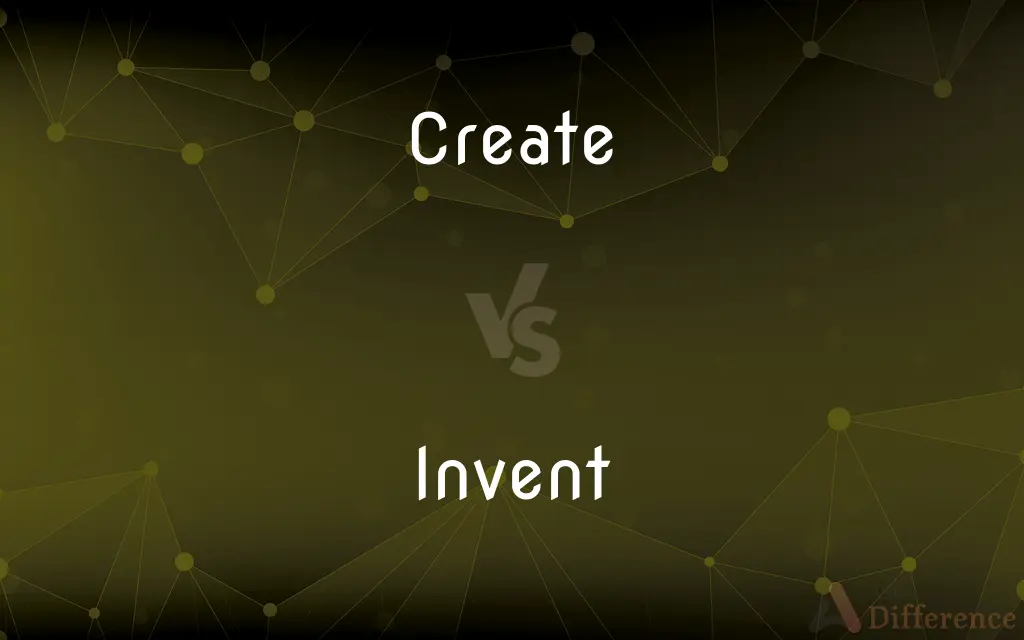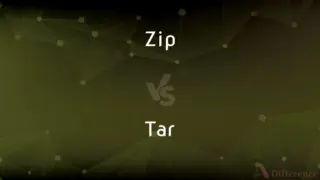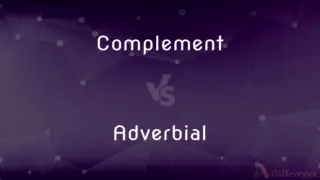Create vs. Invent — What's the Difference?
By Urooj Arif & Maham Liaqat — Updated on March 11, 2024
Create involves bringing something into existence through imagination or design, while invent focuses on devising something new, often with a practical application.

Difference Between Create and Invent
Table of Contents
ADVERTISEMENT
Key Differences
Create is a broad term that encompasses the act of bringing anything into existence, using imagination, skill, or artistry. It can apply to art, literature, music, and more, where the emphasis is on the originality and expressiveness of the creation. On the other hand, invent is more specific and is usually associated with the creation of new devices, processes, or methods, often with a practical or technological application in mind.
Creating often starts with an idea or concept that is then brought to life through various means. This can include writing a story, painting a landscape, or composing a piece of music, where the creator's personal expression and creativity are paramount. Whereas inventing involves a more systematic approach, focused on solving a specific problem or addressing a particular need, leading to the development of new technologies, gadgets, or systems.
Creativity is at the heart of both creating and inventing, but the focus and outcome differ. When one creates, the value might lie in the emotional, aesthetic, or intellectual impact of the work. In contrast, inventing is often driven by the desire to improve functionality, enhance efficiency, or introduce novel solutions to existing problems.
The process of creating can be seen as more introspective and self-expressive, allowing for a broader interpretation of what the end result represents. While inventing requires a deep understanding of the specific area the invention pertains to, often necessitating a blend of scientific knowledge and innovative thinking to create something truly new and useful.
Both creating and inventing share the commonality of bringing something new into existence, yet their paths diverge in intent and application. Creation leans towards the artistic and expressive, inviting reflection and emotional engagement, whereas invention is rooted in practicality, aiming to extend the boundaries of what is technically possible.
ADVERTISEMENT
Comparison Chart
Definition
To bring something into existence through imagination or design.
To devise something new or original, especially a device or process.
Focus
Artistry, expression, and originality.
Practicality, innovation, and functionality.
Associated Fields
Art, literature, music, etc.
Science, technology, engineering, etc.
Outcome
Can be intangible (e.g., a piece of music) or tangible (e.g., a sculpture).
Typically tangible and practical (e.g., a new gadget).
Process
Often introspective and self-expressive.
Systematic, with a focus on problem-solving.
Compare with Definitions
Create
To bring something into existence through imagination or skill.
She loves to create beautiful paintings in her free time.
Invent
To design or create something that has never existed before.
Alexander Graham Bell invented the telephone.
Create
To cause something to happen or come into existence.
The new policy created a lot of controversies.
Invent
To come up with (an idea, plan, explanation, theory, or principle) after a mental effort.
The team invented a new strategy to improve sales.
Create
To produce through artistic or imaginative effort.
The author created a captivating fantasy world in her novel.
Invent
To create a new device, process, or technique through one's own thought and experimentation.
She invented a new method for recycling plastic.
Create
To design or construct something.
He created a unique piece of jewelry for the exhibition.
Invent
To fabricate or concoct something, especially with the intent to deceive.
The child invented an elaborate excuse for being late.
Create
To establish or found something.
They aim to create a new environmental nonprofit organization.
Invent
To create or produce (something useful) for the first time.
Thomas Edison invented the phonograph.
Create
Bring (something) into existence
He created a thirty-acre lake
Over 170 jobs were created
Invent
To produce or contrive (something previously unknown) by the use of ingenuity or imagination.
Create
Make a fuss; complain
Little kids create because they hate being ignored
Invent
To make up; fabricate
Invent a likely excuse.
Create
To cause to exist; bring into being
Created a new music school.
Invent
To design a new process or mechanism.
After weeks of hard work, I invented a new way to alphabetize matchbooks.
Create
To give rise to; produce
That remark created a stir.
Invent
To create something fictional for a particular purpose.
I knew I had to invent an excuse, and quickly.
We need a name to put in this form, so let's just invent one.
Create
To produce through artistic or imaginative effort
Create a poem.
Create a dramatic role.
Invent
(obsolete) To come upon; to find; to discover.
Create
To invest with an office or title; appoint
He was created a baron.
Invent
To discover, as by study or inquiry; to find out; to devise; to contrive or produce for the first time; - applied commonly to the discovery of some serviceable mode, instrument, or machine.
Thus first Necessity invented stools.
Create
Created.
Invent
To frame by the imagination; to fabricate mentally; to forge; - in a good or a bad sense; as, to invent the machinery of a poem; to invent a falsehood.
Whate'er his cruel malice could invent.
He had invented some circumstances, and put the worst possible construction on others.
Create
(transitive) To bring into existence; (sometimes in particular:)
You can create the color orange by mixing yellow and red.
Invent
Come up with (an idea, plan, explanation, theory, or priciple) after a mental effort;
Excogitate a way to measure the speed of light
Create
To bring into existence out of nothing, without the prior existence of the materials or elements used.
Invent
Make up something artificial or untrue
Create
To make or produce from other (e.g. raw, unrefined or scattered) materials or combinable elements or ideas; to design or invest with a new form, shape, function, etc.
Couturiers create exclusive garments for an affluent clientele.
Create
(transitive) To cause, to bring (a non-object) about by an action, behavior, or event, to occasion.
Crop failures created food shortages and high prices; his stubbornness created many difficulties
A sudden chemical spill on the highway created a chain‐collision which created a record traffic jam.
Create
(transitive) To confer or invest with a rank or title of nobility, to appoint, ordain or constitute.
Henry VIII created him a Duke.
Last month, the queen created two barons.
Under the concordate with Belgium, at least one Belgian clergyman must be created cardinal; by tradition, every archbishop of Mechelen is thus created a cardinal.
Create
(intransitive) To be or do something creative, imaginative, originative.
Children usually enjoy creating, never mind if it is of any use!
Create
(transitive) In theatre, to be the first performer of a role; to originate a character.
Create
To make a fuss, complain; to shout.
Create
(obsolete) Created, resulting from creation.
Create
Created; composed; begotten.
Hearts create of duty and zeal.
Create
To bring into being; to form out of nothing; to cause to exist.
In the beginning, God created the heaven and the earth.
Create
To effect by the agency, and under the laws, of causation; to be the occasion of; to cause; to produce; to form or fashion; to renew.
Your eye in ScotlandWould create soldiers.
Create in me a clean heart.
Create
To invest with a new form, office, or character; to constitute; to appoint; to make; as, to create one a peer.
Create
Make or cause to be or to become;
Make a mess in one's office
Create a furor
Create
Bring into existence;
The company was created 25 years ago
He created a new movement in painting
Create
Pursue a creative activity; be engaged in a creative activity;
Don't disturb him--he is creating
Create
Invest with a new title, office, or rank;
Create one a peer
Create
Create by artistic means;
Create a poem
Schoenberg created twelve-tone music
Picasso created Cubism
Auden made verses
Create
Create or manufacture a man-made product;
We produce more cars than we can sell
The company has been making toys for two centuries
Common Curiosities
What is involved in inventing something?
Inventing involves designing or creating something original, often a device or process, that did not previously exist, typically requiring innovation and problem-solving.
What does it mean to create something?
Creating something means bringing it into existence through imagination, design, or effort, ranging from art and music to solutions and systems.
Can creating involve practical objects?
Yes, creating can involve practical objects, especially when design and artistic expression are involved in their creation.
Can someone be both a creator and an inventor?
Yes, individuals can be both creators and inventors, applying their skills and imagination across artistic and practical domains.
Do creators focus on problem-solving?
While creators can focus on problem-solving, their primary aim is often expression and originality rather than practical solutions.
Is artistic expression a part of inventing?
While inventing is primarily driven by functionality, artistic expression can play a role in the design and conceptualization of inventions.
What motivates creators and inventors?
Creators are often motivated by self-expression and originality, while inventors are driven by the desire to solve problems and introduce new solutions.
Is inventing always related to technology?
While inventing is often associated with technology, it can also apply to non-technical areas like business processes or even games.
How do creativity and innovation relate to creating and inventing?
Creativity is central to both creating and inventing, with creativity fueling the original ideas and innovation driving the practical application of those ideas.
Are all inventions patented?
Not all inventions are patented, as the decision to patent depends on various factors, including the inventor's goals and the invention's nature.
Is inventing a systematic process?
Inventing often involves a systematic process, including ideation, experimentation, and refinement, to solve a problem or address a need.
Can an invention be intangible?
Inventions are typically tangible and practical, but intangible inventions can include processes, methods, or systems.
How does society benefit from creating and inventing?
Society benefits from the new ideas, solutions, art, and innovations that creating and inventing bring, driving cultural and technological advancement.
Can inventions be considered a form of art?
Some inventions, particularly those involving unique designs or concepts, can be considered a form of art, blurring the lines between creativity and practicality.
How does one transition from creating to inventing?
Transitioning from creating to inventing can involve focusing on practical applications and solutions for problems, leveraging creativity for innovation.
Share Your Discovery

Previous Comparison
ZIP vs. TAR
Next Comparison
Complement vs. AdverbialAuthor Spotlight
Written by
Urooj ArifUrooj is a skilled content writer at Ask Difference, known for her exceptional ability to simplify complex topics into engaging and informative content. With a passion for research and a flair for clear, concise writing, she consistently delivers articles that resonate with our diverse audience.
Co-written by
Maham Liaqat















































